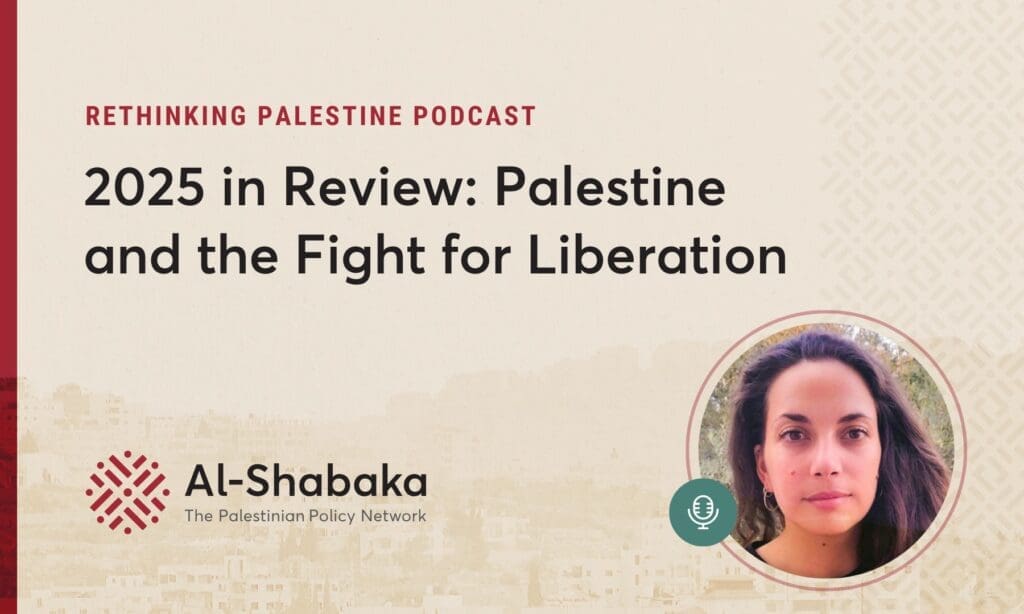About This Episode
Episode Transcript
The transcript below has been lightly edited for brevity and clarity.
Alaa Tartir 0:00
What is common between the Palestinian Authority and the Israeli regime, as far as the revolving door policy is concerned, is that it highlights a shared interest of the Palestinian Authority, Israel, and their international supporters in doing one thing, which is to suppress and silence Palestinian resistance.
Yara Hawari 0:20
From Al-Shabaka, the Palestinian Policy Network, I am Yara Hawari, and this is Rethinking Palestine.
In July 2023, the Israeli regime invaded the Palestinian refugee camp in Jenin and the surrounding areas. It was a brutal invasion. Israeli bulldozers tore up roads, destroyed vital infrastructure and houses, and displaced hundreds of families. Missiles were also launched at the densely packed camp, a sight not seen in the West Bank since 2002.
Dozens of Palestinians were killed and many more injured. Shortly after the Israeli regime army withdrew, Palestinian Authority President Mahmoud Abbas visited Jenin, accompanied by a large number of personnel from the Palestinian Authority’s security forces. Days later, the Palestinian Authority began a crackdown campaign of its own, arresting members of Islamic Jihad and other political factions across Jenin and throughout the West Bank.
Many of those arrested had been previously targeted and/or incarcerated by the Israeli regime. This cycle of incarceration is not coincidental. Rather, it’s known as the revolving door practice and forms a crucial part of the Palestinian Authority’s security coordination with the Israeli regime.
In August 2023, Dr. Alaa Tartir, Al-Shabaka’s program and policy advisor, researcher, and director of the Middle East and North Africa Program at the Stockholm International Peace Research Institute, wrote a policy memo on this practice for Al-Shabaka. You can find it on our website, www.al-shabaka.org. And for this episode, Alaa is joining me to discuss that memo and more about the revolving door practice.
Alaa, thank you for joining me once again on Rethinking Palestine.
Alaa Tartir 2:18
Thank you very much, Yara.
Yara Hawari 2:20
Alaa, let’s start off at the beginning. What is the revolving door practice and why is it called that?
Alaa Tartir 2:27
Well, when the Palestinian Authority was established 30 years ago, it accepted a security framework that effectively made it a subcontractor to the Israeli occupation in the security domain. And the Oslo Accords in that sense was a security arrangement, or a security agreement, in effective terms, to sustain the status quo — and not an agreement to make the Palestinian people living in the West Bank and Gaza in particular closer to statehood or to freedom.
And the key element of that framework, of that security framework, is the so-called security coordination or security collaboration paradigm. Security collaboration or security coordination takes different forms and different shapes, and the revolving door policy is one of its components.
What we call in Arabic “الباب الدوار,” or the revolving door policy, is effectively a mechanism to operationalize the overall security framework agreement or arrangement or coordination that was put in place with the Oslo Accords.
This revolving door is a transactional and operational protocol whereby Palestinians — Palestinian activists, freedom fighters, opposition members — are imprisoned by the Palestinian Authority or the Israeli regime, and then directly or indirectly handed over or handed back to one of those, the Palestinian Authority or Israel.
So for example, the Palestinian Authority can arrest a Palestinian, and a few days, few hours, few weeks, few months later, the person would be arrested by the Israeli regime for the same charges. And vice versa. So it works that Palestinians are imprisoned by the Israeli regime, a list of charges are presented to them, then a few months later they are out. Then the Palestinian Authority comes and arrests them with similar charges. So this is why it is called the revolving door, bab al-dawwar, because it is really this kind of revolving door that leads to prison, either in Palestinian Authority prisons or in Israeli jails, for the same charges.
And that is why it’s also called a revolving door in that sense. Yet it is a revolving door, and it’s a one-way relationship in the sense that only Palestinians are in that revolving door. Meaning it is not reciprocal. You will not see Israeli settlers, for example, in that revolving door. It only concerns Palestinians, and the Palestinian people that go into either of these jails.
And this is a policy that’s been documented over the years, since the inception of the Oslo Accords. It goes to different levels of peakedness depending on the level of mobilization, but it is by now, unfortunately, a well-established policy that operationalizes this security framework and security coordination through that policy.
Finally, what is common between the Palestinian Authority and the Israeli regime, as far as the revolving door policy is concerned, is that it highlights a shared interest — a shared interest of both the Palestinian Authority, Israel, and their international supporters — in doing one thing, which is to suppress and silence Palestinian resistance.
Yara Hawari 6:13
Some might be surprised at such a collaboration with the Israeli regime by the Palestinian Authority. You mentioned the Oslo Accords and how the PA, Palestinian Authority, essentially became a subcontractor for the Israeli regime, particularly in the realm of security. But perhaps you can contextualize this for us and tell us a bit more about this wider collaboration paradigm.
Alaa Tartir 6:41
Let’s agree on one thing at the beginning concerning this so-called collaboration paradigm or security coordination. And let’s agree that there is no such thing as coordination or collaboration within and under frameworks of settler colonialism and apartheid. There is only one thing: there is only domination.
So whenever we talk about security coordination, about security collaborations — these are the terms that are commonly used all the time — they only mean one thing: domination. And that really summarizes why the Palestinian people reject, fundamentally reject, this paradigm of security collaboration and security coordination.
So it is crucial not to be misled by the titles and names of collaboration, because effectively it is domination. But if we want to take a step back and look at this so-called paradigm of security coordination that started and emerged three decades ago with the Oslo agreement and with the establishment of the Palestinian Authority, we notice that it started originally as what we could call a contractual obligation. A contractual obligation in the sense that because of the Oslo framework, because of the conditionality of the international donors and international actors, because of the different security sector reform plans that were put in place, there was a contractual obligation that the Palestinian Authority took too seriously in delivering. And that was how the security coordination was manifested.
However, over the past decade in particular, it transformed into a deep-rooted institutional behavior and even formal identity when it comes to security coordination, to the extent that it became a firm belief that was so deep in the minds and perceptions and actions of the Palestinian Authority’s current and future leadership.
And that’s the problem. It’s not just a concept or practice that belongs to history and the existing leadership of the Palestinian Authority, but also the coming future leadership adopts this paradigm of security collaboration. So it is not surprising in the sense that it was part of the package. It was part of the package of the Oslo Accords to get the Palestinian Authority to do this job when it comes to security collaboration and security coordination, and to effectively serve as a subcontractor to the Israeli regime in the security domain.
The worrying sign is that it is becoming a paradigm that the official Palestinian Authority stances are very passionate and uncompromising about, in the sense that they see security coordination as a bridge to fight what they call violence and radicalization. They see it as an avenue for independence. They insist that security coordination is part and parcel of our liberation strategy. So that is a very unfortunate and surprising thing.
But what we need to keep in mind is that it belongs to the overall larger framework of the Oslo Accords and its security arrangement and security collaboration paradigm. This is why the only time I argue that the Palestinian Authority can and will really stop security coordination with Israel is when the Palestinian Authority ceases to exist in its current shape, form, functions, and leadership.
And to testify to all of this, if I’m not mistaken, the Palestinian Authority threatened or declared over 60 times that it has stopped or is stopping security coordination. Sixty times! And that means it is deeply rooted in the structure of the Oslo Accords and in the structural dimensions that we have there. And this is why it is so deeply rooted.
Yara Hawari 10:42
If you’re enjoying this podcast, please visit our website, al-shabaka.org, where you will find more Palestinian policy analysis, and where you can join our mailing list and donate to support our work.
Alaa, so taking us back to specifically the revolving door policy. It’s not a coincidence — and you mentioned this — that it’s most frequently utilized at a time when there’s heightened Palestinian mobilization or armed resistance.
Alaa Tartir 11:05
It is designed for that. It is designed to be in action when there is heightened mobilization and a higher level of resistance. It is, by definition, created to do that. It is, by definition, created to suppress resistance, be it armed or not armed.
So that’s my definition, because when it is calm, when it is stable, you don’t see this revolving door policy. It’s not visible in that sense. There are other forms of security coordination and other mechanisms that are in place — intelligence sharing and so on.
But it is precisely when there is an intifada, there is an uprising, or there is a height in terms of resistance and there is a new peak of resistance or larger mobilization — that’s when the revolving door policy gets utilized and instrumentalized. So it is by design, designed to do that at that time when Palestinians are mobilizing, when Palestinians are resisting, when Palestinians are acting together to resist the oppression by the Israeli regime. So this is really by design and by default and by definition when it is being utilized.
Yara Hawari 12:24
Can you humanize this for us and paint a picture of what someone who is subjected to this practice goes through?
Alaa Tartir 12:32
This takes me back to over 10 years ago, when I spent some time in the Balata and Jenin refugee camps doing my research. During that time, I interviewed and talked to many Palestinians who were victims of this revolving door policy and documented some of the experiences that they went through.
Until now — and that was over ten years ago — there were two lasting impressions during these conversations with multiple people and refugees, in particular in Balata and Jenin refugee camps, and they are stuck with me. I’ve been thinking a lot about two responses in particular when we discuss security collaboration, but in particular this phenomenon, this revolving door policy.
One of the respondents, I believe from Jenin at the time — and I’m talking here about over 10 years ago — said that the revolving door is a door that revolves around our necks, around our arms, around our resistance, and around our dignity, freedom, and liberation. And that was a powerful illustration from a victim of that policy, of the revolving door policy at the time.
Another voice was that this revolving door policy — he argued then that we must shut it down forever and never open it, because the moment we open one door, then a million other doors will open, and all these doors will lead to hell.
These two quotes from victims of revolving door policies stayed with me for a long time. They illustrate the significance of that, and they illustrate the harm that it could cause — which is known to the Palestinian people, but not to the Palestinian security establishment of the Palestinian Authority.
I’ve had many interviews with people charged with the same charges and imprisoned in both prisons as an illustration of this revolving door policy. Another voice from the Jenin refugee camp also, for example, told me: “I was arrested and detained for nine months in the Palestinian Authority preventive security prison because I was a member of Hamas. Three weeks after my release from the PA prison, Israel arrested me and accused me of the same exact crimes. Literally, they used the same words.”
Another respondent from the Balata refugee camp told me: “After six months of administrative detention in an Israeli jail, and before I got to enjoy the flavor of freedom, the PA forces raided our house after midnight, arrested me, and detained me for eight months. They didn’t ask me any questions in jail. They showed me a document and told me, in Hebrew, beseder, which means ‘all right, your file is ready.’ Just wait for God until he comes and rescues you.”
I read these two quotes and the previous two as direct quotations on this revolving door policy. These go back to over 10 years ago. We can imagine what happened over the past years after that, with the different forms of uprisings that the Palestinians led, which was directly linked with a further increase in the implementation of this revolving door policy.
Yara Hawari 16:05
This seems like a really damaging practice and one that really highlights the Palestinian Authority’s complicity in the oppression of its own people. But beyond condemnation, what can be done to challenge or disrupt the revolving door practice?
Alaa Tartir 16:19
Many things can be done, but really, at the fundamental level, what is needed is to question and reverse the overall framework of the Oslo Accords. Thirty years of that is enough. Thirty years of failing the Palestinians and failing to protect them is a very, very long time.
The security coordination paradigm and the revolving door policy were instrumental in causing that. So really, one of the fundamental asks here is that the Palestinian Authority listens to the Palestinian people and the popular opinion. And it is clear that the vast majority of the Palestinian people want security coordination with Israel to stop now, including the revolving door policy.
This is a key aspect. And it is a political will — it is a clear political declaration that we’ve done with the Oslo Accords and its framework in its 30th anniversary, especially when it comes to security collaboration. So stopping that, although it is not an easy process — as I said earlier, 60 attempts by the Palestinian Authority failed — but it’s enough of that, and it is time to take critical steps to stop that, as a way also to contribute to a process of what we can call national reconciliation.
But also, there is an element of leadership there. There is an element that the external donors and external interventions add lots of political conditionalities when it comes to sustaining security coordination and investing in that. And it is time to say no to that. To say no, there is a need for courageous leadership to say no to these politically conditioned interventions that aim to invest in and sustain security coordination.
Finally, there is a need for Palestinian civil society organizations and human rights organizations to continue documenting the consequences and the implications of the revolving door policy in particular and security coordination at large, especially since there is a denial by the Palestinian Authority that such a policy even exists — although there is strong, ample evidence out there to tell us that this is a well-established policy that’s been documented by human rights organizations over the years and over the decades.
There is a need for a continuation of that, as a way to engage in a constructive and responsible conversation about security coordination and the revolving door policy, as a way of showing that accountability could be possible. We miss accountability. The structures of governance and leadership miss any element of accountability. And this policy dialogue related to security coordination, related to the revolving door policy, could be an avenue to have that constructive debate and constructive conversation about a damaging policy that makes the Palestinians further away from being closer to their freedom.
So these are some of the ideas or recommendations on how to move away from a damaging policy and engage in a process to reverse that.
Yara Hawari 20:11
Alaa, thank you so much for your insightful analysis and for joining me on this episode of Rethinking Palestine.
Alaa Tartir 20:20
Thank you very much.
Yara Hawari 20:26
Rethinking Palestine is brought to you by Al-Shabaka, the Palestinian Policy Network. Al-Shabaka is the only global, independent Palestinian think tank, whose mission is to produce critical policy analysis and collectively imagine a new policymaking paradigm for Palestine and Palestinians worldwide. For more information or to donate to support our work, visit al-shabaka.org, and importantly, don’t forget to subscribe to Rethinking Palestine wherever you listen to podcasts.
Al-Shabaka: The Palestinian Policy Network is an independent, non-partisan, and non-profit organization whose mission is to convene a multidisciplinary, global network of Palestinian analysts to produce critical policy analysis and collectively imagine a new policymaking paradigm for Palestine and Palestinians worldwide.
Alaa Tartir is Al-Shabaka’s program and policy advisor. He is a senior researcher and director of the Middle East and North Africa Programme at Stockholm International Peace Research Institute, as well as a research associate and academic coordinator at the Geneva Graduate Institute, global fellow at the Peace Research Institute Oslo, and governing board member of the Arab Reform Initiative. Alaa holds a PhD from the London School of Economics and Political Science and is co-editor of Resisting Domination in Palestine: Mechanisms and Techniques of Control, Coloniality and Settler Colonialism (2023), Political Economy of Palestine: Critical, Interdisciplinary, and Decolonial Perspectives (2021) and Palestine and Rule of Power: Local Dissent vs. International Governance (2019). He can be followed on Twitter (@alaatartir), and his publications can be accessed at www.alaatartir.com.


















